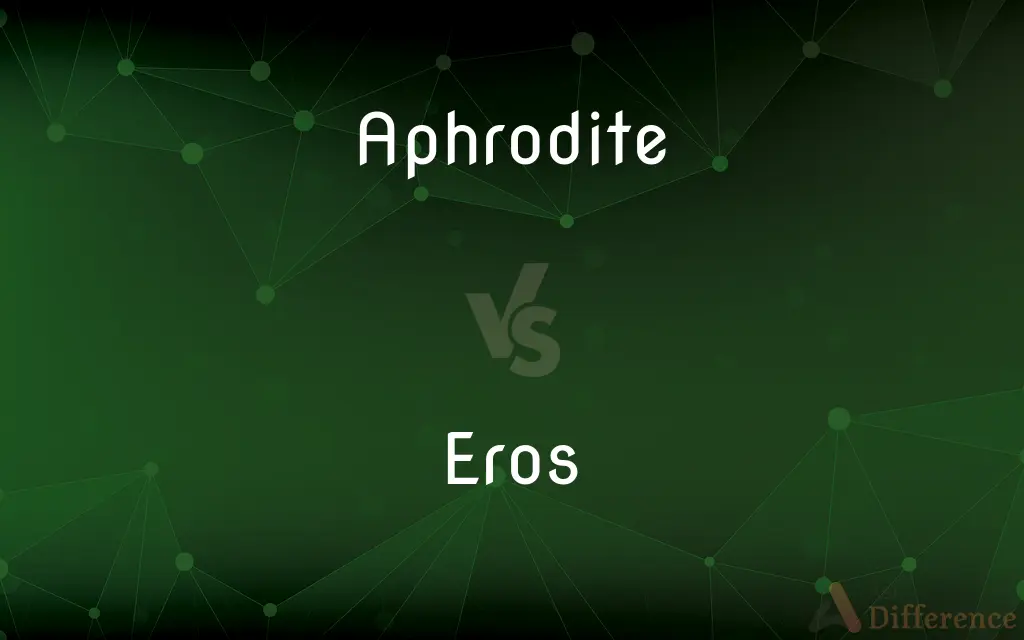Aphrodite vs. Eros — What's the Difference?
By Urooj Arif & Maham Liaqat — Updated on April 8, 2024
Aphrodite is the Greek goddess of love, beauty, and desire, known for her captivating beauty and romantic escapade, while Eros, often depicted as her son, is the god of attraction and passionate love, embodying the irresistible force of attraction.

Difference Between Aphrodite and Eros
Table of Contents
ADVERTISEMENT
Key Differences
Aphrodite, according to Greek mythology, emerged from the sea foam, symbolizing beauty and fertility, and is revered as one of the twelve Olympians. Her role encompasses love, beauty, and procreation, influencing human and godly realms with her allure. Eros, conversely, is often portrayed as a playful and mischievous figure, wielding a bow with arrows that inflame the hearts of gods and mortals with uncontrollable desire. While Aphrodite's power lies in her divine beauty and the broad spectrum of love and desire she represents, Eros specifically personifies the intense, impulsive aspects of desire.
Aphrodite's mythology includes numerous love affairs, marriages, and involvements in the lives of gods and heroes, illustrating her influence over all forms of love and attraction. Eros, while also involved in mythological tales, acts more directly by causing immediate and intense attraction, often leading to unexpected and sometimes troublesome liaisons. His actions, while under Aphrodite's domain, operate independently, showing the spontaneity of passionate love.
The worship of Aphrodite was widespread in the ancient Greek world, with numerous temples and rituals dedicated to her honor. She was celebrated not only as a goddess of physical beauty but also as a patron of marital harmony and fertility. Eros' worship was less formalized, with his cult primarily focusing on the aspect of fertility and the fundamental, often chaotic, nature of love and attraction.
In art and literature, Aphrodite is depicted as eternally beautiful, often accompanied by symbols of love and beauty such as doves, sparrows, and roses. Eros is frequently shown as a winged youth or child, with his bow and arrows serving as potent symbols of love's sudden and unpredictable effects. Their representations in art highlight their distinct roles in the realm of love, from the enduring beauty and complex relationships of Aphrodite to the immediate, piercing nature of Eros' influence.
Despite their differences, Aphrodite and Eros share a deep connection in mythology, representing complementary aspects of love and desire. Aphrodite’s encompassing power over love, combined with Eros’ ability to spark immediate passion, underscores the multifaceted nature of love in Greek mythology, from its physical forms to its most profound emotional expressions.
ADVERTISEMENT
Comparison Chart
Domain
Love, beauty, and fertility.
Attraction and passionate love.
Mythology
Born from sea foam, an Olympian goddess.
Often depicted as Aphrodite’s son, a god with the power to cause instant attraction.
Symbolism
Doves, sparrows, roses, and myrtle.
Bow and arrows, wings.
Role in Myths
Involved in numerous affairs and stories, influencing both gods and mortals.
Causes gods and mortals to fall passionately in love, often leading to chaos.
Worship
Wide-ranging cults and temples dedicated to her honor, symbolizing marital harmony and fertility.
Less formalized worship, focusing on fertility and the primal nature of love.
Representation
Eternally beautiful woman, often depicted in art and literature surrounded by symbols of love.
Winged youth or child, symbolizing the sudden and unpredictable nature of love.
Influence
Broad spectrum of love, desire, and beauty.
Specific focus on the passionate and often chaotic aspect of love.
Compare with Definitions
Aphrodite
Symbolizes the complex nature of love.
Aphrodite's involvement in mythological tales illustrates the many facets of love.
Eros
Depicted as a mischievous youth.
Artworks of Eros often show him as playful, with his bow and arrows at the ready.
Aphrodite
Patron of marital harmony.
Couples would pray to Aphrodite for a happy and fruitful marriage.
Eros
Son of Aphrodite, embodying desire.
As Aphrodite's son, Eros shares his mother's domain over love.
Aphrodite
Greek goddess of love and beauty.
Sculptures of Aphrodite often emphasize her divine beauty and grace.
Eros
Represents the spontaneous nature of love.
Eros' influence is sudden, like the unexpected strike of love's arrow.
Aphrodite
Born from the sea, representing fertility.
Aphrodite's birth from the foam of the sea symbolizes life and creation.
Eros
Less formal worship than Aphrodite.
Though not as widely worshiped as Aphrodite, Eros was revered for his role in the dynamics of love.
Aphrodite
Depicted with symbols of love.
Aphrodite is often shown with doves, representing love and peace.
Eros
God of passionate love and attraction.
Eros' arrows could make any god or mortal fall in love.
Aphrodite
Aphrodite is an ancient Greek goddess associated with love, beauty, pleasure, passion and procreation. She was syncretized with the Roman goddess Venus.
Eros
Greek Mythology The god of love, son of Aphrodite.
Aphrodite
The goddess of love and beauty. Also called Cytherea.
Eros
The sum of all instincts for self-preservation.
Aphrodite
(mineral) A soft and earthy mineral of a white or yellowish color, and with a waxy lustre, found at Langbanshytta in Sweden. It is a hydrated silicate of magnesia, and resembles meerschaum.
Eros
A winged figure of a child representing love and/or its power.
Aphrodite
The Greek goddess of love, corresponding to the Venus of the Romans.
Eros
A type of love that seeks fulfillment without violation or something else.
Aphrodite
A large marine annelid, covered with long, lustrous, golden, hairlike setæ; the sea mouse.
Eros
(psychiatry) libido
Aphrodite
A beautiful butterfly (Argunnis Aphrodite) of the United States.
Eros
(psychiatry) collective instincts for self-preservation; life drive.
Aphrodite
Goddess of love and beauty and daughter of Zeus in ancient mythology; identified with Roman Venus
Eros
Love; the god of love; - by earlier writers represented as one of the first and creative gods, by later writers as the son of Aphrodite, equivalent to the Latin god Cupid.
Eros
(Greek mythology) god of love; son of Aphrodite; identified with Roman Cupid
Common Curiosities
Do Aphrodite and Eros work together?
In myths, their actions often intersect, with Eros enacting the immediate aspects of attraction that fall under Aphrodite's broader domain.
Can Eros control Aphrodite?
Mythology suggests that even Aphrodite is not immune to Eros' arrows, indicating the universal power of passionate love.
Are there any myths where Aphrodite and Eros conflict?
While their myths often intersect, they typically portray a cooperative relationship in their roles as deities of love.
What is the significance of Eros' arrows?
Eros' arrows symbolize the power of love to strike swiftly and unexpectedly, leading to profound changes in the hearts of those pierced.
What impact did Aphrodite and Eros have on Greek culture?
They significantly influenced Greek culture, from art and literature to religious practices, embodying the ideals and complexities of love.
Who is more powerful, Aphrodite or Eros?
Aphrodite holds broader powers over love, beauty, and fertility, making her influence more encompassing than Eros', who specifically governs passionate love.
What lessons do Aphrodite and Eros teach?
Their myths convey the complexities of love and desire, from the beauty and harmony of relationships to the chaos and intensity of sudden attraction.
How do depictions of Aphrodite and Eros differ in art?
Aphrodite is depicted as the epitome of beauty and femininity, while Eros is often shown as a youthful, winged figure, highlighting their different aspects of love.
How are Aphrodite and Eros related?
Eros is often described as the son of Aphrodite, linking their divine roles in the realms of love and attraction.
How did worshipers honor Aphrodite and Eros?
Aphrodite was honored with festivals and rituals celebrating love and beauty, while Eros' worship focused more on the aspect of fertility and the primal forces of attraction.
Share Your Discovery

Previous Comparison
Malaria vs. Typhoid
Next Comparison
Parallel vs. AntiparallelAuthor Spotlight
Written by
Urooj ArifUrooj is a skilled content writer at Ask Difference, known for her exceptional ability to simplify complex topics into engaging and informative content. With a passion for research and a flair for clear, concise writing, she consistently delivers articles that resonate with our diverse audience.
Co-written by
Maham Liaqat













































